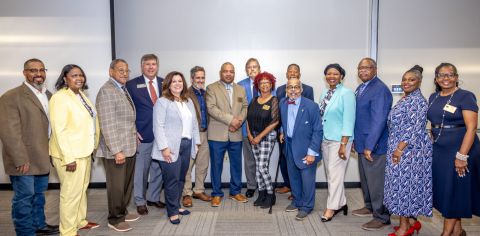Newsroom
Fort Valley State University Extension hosts the 43rd Ham and Egg Breakfast
Posted on May 01, 2025

Elected officials gather for a group photo after the 43rd annual Ham and Egg Legislative Breakfast at the Pettigrew Farm and Community Life Center on Fort Valley State University’s campus.
Fort Valley State University’s (FVSU) Cooperative Extension Program hosted the 43rd Ham and Egg Legislative Breakfast on Thursday, April 17, at the C.W. Pettigrew Farm and Community Life Center on campus. Approximately 140 people attended the event, including elected officials, alumni, Extension employees and farmers.
This historical event included a southern style breakfast with country ham, grits, eggs, bacon, sausage and biscuits. In addition to the hearty breakfast, participants listened to updates from elected officials. New to the breakfast was an opportunity for a farmer to share concerns and discuss the impact of FVSU’s Cooperative Extension Program.
Handy Kennedy, operator of HKJ Ranch, shared how his relationship with FVSU Extension and his opportunity to benefit from research-based information has increased his production.
Kennedy shared that rising input costs, natural disasters, the response to natural disasters by the government and access to capital and credit, are some of the challenges farmer's encounter.
He also shared how limited access to commercial markets, limited infrastructure for small farmers to process, package and distribute their own commodities, and limited investment to improve their operations have become barriers. He credits FVSU to helping reduce some of the challenges and barriers through an organization called AgriUnity.
“We partner with Fort Valley. By partnering with Fort Valley, we were able to focus on cattle. I’m a fourth-generation rancher. Most of our farmers were selling their cattle in the least profitable way. I was operating at about a 2 percent profit margin. I was about to get out of the cattle business. There was no way to make money. I met the staff of Fort Valley. They changed the way I think,” Kennedy said.
The fourth-generation rancher said he is proud to say FVSU Extension invested in him by doing research on his farm.
“Now I am doing AI (Artificial Intelligence), and I can offer better calves to farmers in my network. Five years ago, we were operating at a 2 percent profit margin, now we are at 18 percent,” Kennedy said.
After remarks from Kennedy and elected officials, Congressman Sandford Bishop provided federal updates. He began his address by saying that things are not good.
“We didn’t pass an appropriations bill for the Fiscal Year 2025 which should have been done in September 2024,” Bishop said. In addition, Bishop said the Farm Bill which provided continuity, certainty and a blueprint for our farmers should have been passed two years ago.
Likewise, Bishop discussed that our research institutions (1862 and 1890 Land-grant Universities) have been doing a great job fulfilling the land grant mission. He explained that land grant universities have been able to get resources to conduct research, helping to expand and develop young beginning farmers and provide education and technical assistance when needed.
Because a new set of priorities are taking the lead, there is a tug-of-war taking place in Washington. Bishop described it as paralyzing.
As a result of the delays and changes, the Congressman encouraged attendees to be vocal about their concerns.
“We will do our best to get things right. Let those that are in policymaking positions know the impacts these changes are having on your lives,” Bishop said.
Small farmer Brendia King expressed her thoughts concerning the changes that impact farmers.
“We know the situation is bleak. All you have to do is watch the news. But it is refreshing to know that they are not giving in just because they are being overwhelmed. They are still fighting. I want them to know that we are still fighting too,” King said.
Dr. Mark Latimore Jr., associate dean for FVSU Cooperative Extension, said this was the first time they added a farmer to the agenda to share successes, concerns and future opportunities. Latimore said hearing how these changes impact farmers provide Extension an opportunity to address the pressures farmers face.
“The current climate has increased mental stress among our farmers. I now see this as an opportunity for us to get more engaged in mental stress education and develop resources for farmers,” Latimore said.
For more information about programs offered by FVSU Cooperative Extension, visit https://bit.ly/3EuBTXF
- Categories:
- Outreach